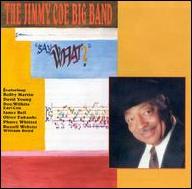His usual band assignment was baritone sax, which he played on the rare broadcast and studio sessions that have been preserved from the McShann period. Of course, the McShann material featuring Parker has accumulated more releases than fingerprints on a motel water faucet. Coe served in the Army from 1943 to 1945, playing with the 415th Band while stationed in New Guinea. He recorded again not too long after his discharge from the Armed Forces, this time for Columbia, with saxophonist and singer Buster Bennett and legendary Chicago bassist Duke Groner. In the late '40s, Coe began the study of clarinet at Butler University. In 1952, he was able to record under his own name, with vocalist Flo Garvin in front of Jimmy Coe His Orchestra. Amongst the sides cut by this combination was a pungent version of I Got It Bad and That Ain't Good. Outside, a ballad, comes with an alto sax intro by Coe that is surely an improvement over that very first solo, although it might have still put Parker to sleep. Recording with Tiny Bradshaw in the early '50s, Coe laid down one of his best lengthy alto solos on record in the tune Lay It on the Line. The saxophonist continued leading his own group in local venues and jamming at after-hours joints. The group Jimmy Coe His Gay Cats of Rhythm recorded in 1953, and much of these original sessions were reissued on Delmark. In the late '50s, Coe recorded fronting an orchestra for the new Chess label, cutting tracks such as Every Day of the Week and Shuffle Stroll. In the early '60s, Coe and his group provided backup for the contest-winning vocal group the Students, and the saxophonist may also have accompanied other vocal groups, or participated in other recordings for other microlabels in the Indianapolis area. He began spending most of his time teaching music in the Indianapolis public schools, remaining in tune to developments in both jazz and RB. He started a 17-piece big band around 1965, backing such performers as Betty Fields, Aretha Franklin, Roy Hamilton, Al Hibbler, Gladys Knight the Pips, and even comedians such as Moms Mabley and Rowan Martin. Coe produced a soul-jazz single himself and put it out on a label called Intro, probably released in the early '70s, featuring two instrumentals, both with solos by Coe. For a decade or so beginning in 1972, he worked a day job and in 1982. Coe's orchestra backed Reverend James Cleveland at a gospel concert. In the '90s, when many listeners thought he would never be heard from again, Coe reappeared with a full CD on Timeless featuring his big band. ~ Eugene Chadbourne, Rovi
Jimmy Coe
from Tompkinsville, KY
March 20, 1921 (age 104)
Biography
A fine reed player who worked with many jazz greats, Jimmy Coe has always slipped through the cracks when it came to building a reputation, as if his three-letter surname was too short for anyone to make an impression. Perhaps the problem was not his name, but his location. Except for periods on the road and his service during the second World War, he remained in Indianapolis, the town he was brought up in, for his entire career. One thing that can be said about the Hoosier capital: it was never a recording center. Prior to the early '70s, all of Coe's recordings were tracked elsewhere, usually Chicago. He began playing professionally at 17 and he functioned in fast-moving musical company right from the get-go. At 20, he was already touring with Jay McShann's band, honor enough until the fact that he was replacing Charlie Parker gets added to the picture. It was an assignment no musician would envy, but to make matters worse, Coe has recollected that Parker himself was in the audience and fell asleep while Coe took what was actually his first solo on alto saxophone in front of an audience. Some musicians endure a trial by fire; this was a trial by snoring.
Top Tracks
Albums
Videos
Close













